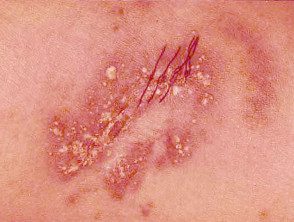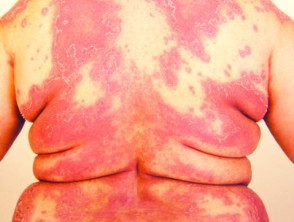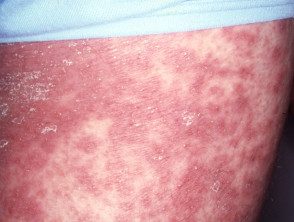What is it generalized pustular psoriasis?
Generalized pustular psoriasis is a rare and serious skin disorder that presents with outbreaks of extended sterile pustules on a background of red and tender leather. Also known as acute generalized pustular psoriasis of von Zumbusch.
Related pustular disorders include:
- Subcorneal pustular skin disease
- Acute generalized exanthematous pustulosis (AGEP)
- Palmoplantar pustulosis (hands and feet)
-
Acrodermatitis continua of Hallopeau (pustulosis of digits)
Generalized pustular psoriasis.

pustular psoriasis

pustular psoriasis

pustular psoriasis
See more images of generalized pustular psoriasis.
What causes generalized pustular psoriasis?
Generalized pustular psoriasis is a inflammatory Skin illness. Recent research suggests that generalized pustular psoriasis is distinct from psoriasis, with a different pattern of immune activation. Generalized pustular psoriasis has been associated with abnormalities in the cytokine (messenger protein) interleukin -36-receiver-signaling antagonist. This is due to recessive IL36RN gene mutations. These mutations are also found in some patients with AGEP, palmoplantar pustulosis, and acrodermatitis continua of Hallopeau.
About 10% of patients with generalized pustular psoriasis have a history of psoriasis, in which there is persistence, circumscribed, Red and scaly plates. In these patients, gain-of-function abnormalities of the CARD14 gene have been reported.
Possible triggers for generalized pustular psoriasis flare-ups may include:
- Sudden withdrawal from injected or oral corticosteroids.
- Medications such as lithium, aspirin, indomethacin, iodide, and some beta-blockers.
- Infection.
Generalized pustular psoriasis sometimes arises in pregnancy. Formerly known as impetigo herpetiformis, this name is no longer favored because the eruption has nothing to do with impetigo (a bacterial infection) or herpes simplex (a viral infection).
Strong, irritating current preparations such as coal tar, dithranol, and withdrawal of strong topical corticosteroids can lead to located areas of pustulosis, often associated with existing plaques of psoriasis.
What are the signs and symptoms of generalized pustular psoriasis?
Generalized pustular psoriasis is characterized by recurrent acute rashes
- Initially, the skin becomes dry, fiery red and sensitive.
- Within hours, 2–3 mm pustules appear.
- After a day, the small pustules get together to form lakes of pus
- These are dried and peeled to leave a smooth, glazed surface on which new cultures of pustules can appear.
- Successive cultures of pustules may appear and erupt every few days or weeks.
Systemic symptoms
Flare-ups of generalized pustular psoriasis can cause:
- Fever and chills (or hypothermia)
- A headache
- rapid pulse
- Loss of appetite and nausea.
- Thirst and dehydration
- Muscular weakness
- Leg swelling.
Remission occurs within days or weeks and the skin returns to its previous state or erythroderma can develop. Relapses They are common.
How is generalized pustular psoriasis diagnosed?
Generalized pustular psoriasis is often clinically suspected by experienced dermatologists. However, the following tests are usually done to confirm the diagnosis and identify potential complications.
- Laboratory tests for bacterial infection.
-
Skin biopsy, showing superficial (subcorneal) pustules and neutrophilic infiltration in histopathology
- Blood cell count
- Kidney and liver function
- Electrolytes, Calcium/Phosphate
What are the complications of generalized pustular psoriasis?
Death can be the result of cardiorespiratory failure during the acute eruptive phase of generalized pustular psoriasis, so it is essential to treat it as soon as possible. Older patients are at higher risk. Other complications include:
- Secondary bacterial infection
- The blood count may show anemianeutrophilia lymphopenia
- Elevated inflammatory markers such as C-reactive protein (CRP)
- Disturbed protein and electrolyte balance, low albumin, low calcium, and low zinc
- High output heart failure
- Renal and liver failure
- protein losing enteropathy
- Peripheral neuropathy
- Malabsorption of nutrients and therapeutic drugs
What treatment is available for generalized pustular psoriasis?
Generalized pustular psoriasis can be fatal, so hospitalization is usually required. The goal is to prevent further fluid loss, stabilize body temperature, and restore electrolyte imbalance. Specialized care is essential.
Affected areas are treated with soft topical compresses using emollients and low-potency topical steroid creams.
Systemic medications may include:
-
Antibiotics for confirmed or suspected infection.
- Acitretin
-
Systemic corticosteroids (with caution)
-
Cyclosporine (with caution)
- Methotrexate
- Colchicine
-
Biologic agents including infliximab, etanercept, ustekinumab, adalimumab, and anakinra.
Anti-IL36 monoclonal antibodies are being evaluated for their effectiveness in generalized pustular psoriasis.

